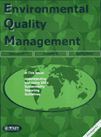
ENVIRONMENTAL QUALITY MANAGEMENT
Scope & Guideline
Championing Interdisciplinary Approaches to Environmental Challenges
Introduction
Aims and Scopes
- Sustainable Environmental Practices:
Research promoting sustainable practices in various sectors, including agriculture, industry, and urban development, aimed at reducing environmental degradation and enhancing resource efficiency. - Pollution Assessment and Remediation:
Studies focused on assessing pollution levels in air, water, and soil, alongside exploring innovative remediation technologies to mitigate environmental contaminants. - Waste Management and Resource Recovery:
Research on effective waste management strategies, including recycling, waste-to-energy technologies, and circular economy practices to minimize waste and recover valuable resources. - Impact of Climate Change:
Investigations into the effects of climate change on ecosystems and human health, with a focus on adaptation strategies and mitigation efforts to reduce vulnerability. - Technological Innovations:
Development and application of advanced technologies, such as nanotechnology, biotechnology, and machine learning, for environmental monitoring and management. - Policy and Governance:
Analysis of environmental policies, regulatory frameworks, and governance structures that influence environmental quality and sustainability practices.
Trending and Emerging
- Microplastic Pollution and Management:
An increasing number of studies are addressing microplastic pollution, focusing on its sources, impacts, and innovative removal techniques, underscoring the urgency of this environmental issue. - Bioremediation and Eco-Friendly Solutions:
Research on bioremediation strategies utilizing indigenous microorganisms and natural substances is trending, reflecting a shift towards sustainable and environmentally friendly remediation approaches. - Circular Economy Innovations:
Emerging themes around circular economy practices are prevalent, emphasizing sustainable production and consumption models that aim to minimize waste and maximize resource recovery. - Climate Change Adaptation Strategies:
As climate change impacts intensify, research focusing on adaptation strategies for ecosystems and communities is gaining importance, highlighting resilience and sustainability. - Data-Driven Environmental Management:
The use of data analytics, machine learning, and IoT technologies for real-time environmental monitoring and management is on the rise, demonstrating the integration of technology into environmental practices. - Public Health and Environmental Quality Nexus:
Research exploring the intersection of environmental quality and public health is increasingly prominent, emphasizing the health impacts of environmental pollutants and the need for integrated management approaches.
Declining or Waning
- Traditional Waste Treatment Methods:
Research on conventional waste treatment methods is becoming less prevalent as newer, more sustainable approaches gain traction, such as biotechnological and circular economy solutions. - Single-Use Plastics:
Although initially a hot topic, the focus on single-use plastics has diminished as the discourse shifts towards comprehensive waste management strategies and sustainable alternatives. - Local Case Studies:
There is a noticeable decline in studies focusing solely on localized case studies without broader implications, as the journal increasingly emphasizes research with global relevance and applicability. - Heavy Metal Contamination in Isolation:
While still important, the isolated focus on heavy metals in environmental studies is decreasing, replaced by a more integrated approach that considers multiple pollutants and their interactions. - Reactive Chemical Treatments:
Research centered on reactive chemical treatments for environmental issues is waning as the field moves towards greener, more sustainable chemical processes.
Similar Journals

Environments is a distinguished international journal published by MDPI, focusing on the interdisciplinary realm of ecology, environmental sciences, and sustainability. Established in 2014, this Open Access journal allows unrestricted access to its high-quality research articles, making it an essential resource for researchers, professionals, and students alike. With its impact factor and Scopus ranks reflecting its academic significance—including a Q1 ranking in Ecology, Evolution, Behavior and Systematics—Environments serves as a critical platform for the dissemination of innovative research and practical applications in addressing pressing environmental challenges. The journal's commitment to promoting sustainability and renewable energy initiatives aligns with global efforts to foster a better understanding of our ecological systems and enhances its relevance in today’s rapidly evolving environmental landscape. The journal is based in Switzerland and encompasses a broad scope dedicated to advancing scholarly dialogue in environments related to ecological and environmental science.

Global NEST Journal
Pioneering research for a healthier planet.Global NEST Journal, published by the GLOBAL NETWORK ENVIRONMENTAL SCIENCE & TECHNOLOGY, stands as a vital resource for researchers and practitioners in the field of environmental science. With its established trajectory since 2001 and a current category quartile ranking of Q3 in Environmental Science (miscellaneous), this journal serves as an important platform for disseminating innovative research and insights that address pressing global environmental challenges. Based in Athens, Greece, the journal is accessible to a wide audience, facilitating collaboration and knowledge sharing across disciplines. Despite its open access status being unspecified, the Global NEST Journal aims to enrich the academic community by publishing original research articles, reviews, and case studies on various aspects of environmental science and technology. By fostering a deeper understanding of complex environmental issues, this journal not only enhances academic discourse but also contributes to practical solutions for a sustainable future.

Rocznik Ochrona Srodowiska
Connecting Ideas and Innovations in Environmental ScienceRocznik Ochrona Srodowiska, published by the Middle Pomeranian Scientific Society for Environmental Protection, is an esteemed journal dedicated to advancing the field of environmental science in Poland and beyond. With an ISSN of 1506-218X, this peer-reviewed journal has established itself as a vital resource since its inception in 2007, addressing various environmental issues and promoting sustainable practices. Currently holding a Q3 category ranking in the Environmental Science (miscellaneous) field for 2023, it places itself in the 23rd percentile of Scopus rankings, reflecting a growing influence in the broader environmental research community. While the journal is not open access, it serves as an important conduit for researchers, professionals, and students to disseminate their findings and contribute to the interdisciplinary dialogue aimed at tackling pressing environmental challenges. With a commitment to rigorous research and practical applications, Rocznik Ochrona Srodowiska remains an essential platform for fostering innovation and collaboration in environmental studies.
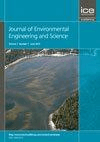
Journal of Environmental Engineering and Science
Unveiling Cutting-Edge Methodologies in Environmental StudiesJournal of Environmental Engineering and Science, published by Emerald Group Publishing Ltd, is a prominent academic platform dedicated to the dissemination of cutting-edge research in the fields of environmental engineering, chemistry, and science. This journal, with ISSN 1496-2551 and E-ISSN 1496-256X, features a comprehensive collection of studies that delve into innovative methodologies and practical applications aimed at solving pressing environmental issues. Having been published since 2002, it spans critical research years from 2015 to 2024, offering insights that are invaluable to both academics and practitioners alike. With its current rankings placing it in the fourth quartile for Environmental Chemistry and Engineering, and the third quartile in miscellaneous Environmental Science, the journal serves as a significant yet under-utilized resource for emerging scholars seeking to contribute to the ecological discourse. Though it does not offer Open Access, the content is meticulously curated to uphold academic rigor, catering especially to researchers, professionals, and students keen on advancing their understanding of environmental challenges and engineering solutions.
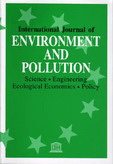
INTERNATIONAL JOURNAL OF ENVIRONMENT AND POLLUTION
Advancing Environmental Insights for a Sustainable FutureInternational Journal of Environment and Pollution is a pivotal publication in the field of environmental science, dedicated to advancing knowledge concerning pollution and its multifaceted impacts on ecosystems and human health. Published by InderScience Enterprises Ltd, this journal, which has been in circulation since 1991, serves as a vital platform for researchers, professionals, and students interested in the management, monitoring, policy, and law associated with environmental issues. With an ISSN of 0957-4352 and E-ISSN 1741-5101, it offers a critical perspective on pollution challenges, emphasizing Waste Management and Disposal. Although placed in the Q4 quartile of its categories, it remains an important resource for understanding the complexities of environmental impact, contributing to policy formulation and ecological research. The journal does not offer Open Access, but it can be accessed through various academic libraries and institutions that value comprehensive studies in environmental management. Engage with the latest findings and discussions that address pressing environmental concerns today!
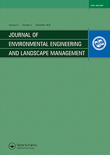
Journal of Environmental Engineering and Landscape Management
Innovating Environmental Engineering and Landscape PracticesJournal of Environmental Engineering and Landscape Management, published by VILNIUS GEDIMINAS TECH UNIV, serves as a pivotal platform for disseminating innovative research in the fields of environmental engineering and landscape management. With an Open Access policy since 2018, this journal fosters global knowledge exchange and accessibility, enhancing collaboration among researchers, professionals, and students alike. The journal, indexed under ISSN 1648-6897 and E-ISSN 1822-4199, features a diverse range of topics covering environmental engineering, management policies, and conservation strategies, thus contributing to sustainable development practices. As of 2023, it holds a Q3 quartile ranking across multiple categories, including Environmental Engineering and Nature and Landscape Conservation, demonstrating its commitment to excellence amidst competitive academic fields. The journal spans from 2004 to 2024, steadily solidifying its influence and relevance in shaping environmental discourse and practices. Join a vibrant community of scholars dedicated to addressing pressing environmental challenges through this distinguished publication.

GLOBAL JOURNAL OF ENVIRONMENTAL SCIENCE AND MANAGEMENT-GJESM
Bridging disciplines to enhance environmental stewardship.Global Journal of Environmental Science and Management (GJESM), published under the distinguished leadership of Professor J. Nouri, is an esteemed academic platform dedicated to advancing the interdisciplinary discourse surrounding environmental science and management. With an ISSN of 2383-3572 and an E-ISSN of 2383-3866, GJESM has established itself as a prominent Open Access journal since 2014, allowing for unrestricted sharing of knowledge and research findings. Based in Iran, this journal caters to a diverse global audience, featuring contributions that span various critical domains including agricultural and biological sciences, environmental engineering, pollution management, and social sciences, evidenced by its impressive 2023 Q1 and Q2 quartile rankings across multiple categories. The journal’s Scopus rankings demonstrate a robust standing in the academic landscape, with exciting placements that underscore its relevance in key fields. By bridging the gap between scientific inquiry and practical application, GJESM serves as a vital resource for researchers, practitioners, and students seeking to understand and address the pressing environmental challenges faced by our planet today.

Water Conservation Science and Engineering
Advancing Sustainable Solutions for Water PreservationWater Conservation Science and Engineering, published by SPRINGERNATURE, is a vital academic journal dedicated to advancing the fields of environmental engineering, ocean engineering, waste management, and water science and technology. Since its inception in 2016, the journal has quickly established itself within the academic community, achieving a commendable Q3 ranking across multiple categories in 2023. With an ISSN of 2366-3340 and an E-ISSN of 2364-5687, it is accessible to a global readership eager to explore the latest research and innovations in water conservation and sustainable practices. Although currently not open access, the journal is committed to publishing high-quality scholarly articles that provide insights into effective water management strategies, innovative engineering solutions, and the critical importance of preserving our water resources. Based in Singapore, Water Conservation Science and Engineering aims to foster interdisciplinary collaboration among researchers, professionals, and students, making it an essential resource for anyone passionate about environmental sustainability and preservation.
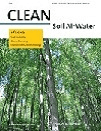
CLEAN-Soil Air Water
Connecting Ideas for a Cleaner, Greener TomorrowCLEAN-Soil Air Water, an esteemed journal published by Wiley, serves as a vital platform for disseminating research in the fields of environmental chemistry, pollution, and water science and technology. Operating under an Open Access model, it embraces the principles of knowledge sharing, making significant research findings readily accessible to a global audience. With an ISSN of 1863-0650 and an E-ISSN of 1863-0669, the journal has demonstrated its importance in the academic community, reflected in its Scopus rankings within the top quartiles of its categories. Established in 2007 and continuing through to 2024, CLEAN-Soil Air Water offers researchers, professionals, and students an opportunity to explore innovative studies that address pressing environmental challenges, facilitating an exchange of novel ideas and techniques essential for sustainable development. With a publication footprint in Germany and a growing international reputation, this journal is an invaluable resource for those dedicated to advancing the science and practices of environmental stewardship.
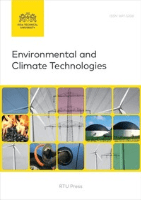
Environmental and Climate Technologies
Innovating Research for Climate Resilience.Environmental and Climate Technologies is a premier open-access journal dedicated to advancing knowledge in the fields of environmental science and renewable energy. Published by SCIENDO since 2009, this journal plays a crucial role in disseminating innovative research and interdisciplinary studies that address the pressing challenges posed by climate change and sustainable development. With its current positioning in the Q2 quartile for Environmental Science (miscellaneous) and Q3 for Renewable Energy, Sustainability and the Environment, it is recognized for its significant contributions to the academic community, ranking #107 out of 233 in General Environmental Science and #161 out of 270 in Renewable Energy. Hailing from Germany and operating under an open-access policy, Environmental and Climate Technologies ensures that research remains accessible to a global audience, fostering collaboration and discussion among researchers, professionals, and students alike. The journal invites rigorous scientific inquiries and practical solutions that can mitigate the impact of climate-related issues, making it a vital resource for those committed to environmental stewardship and sustainability.